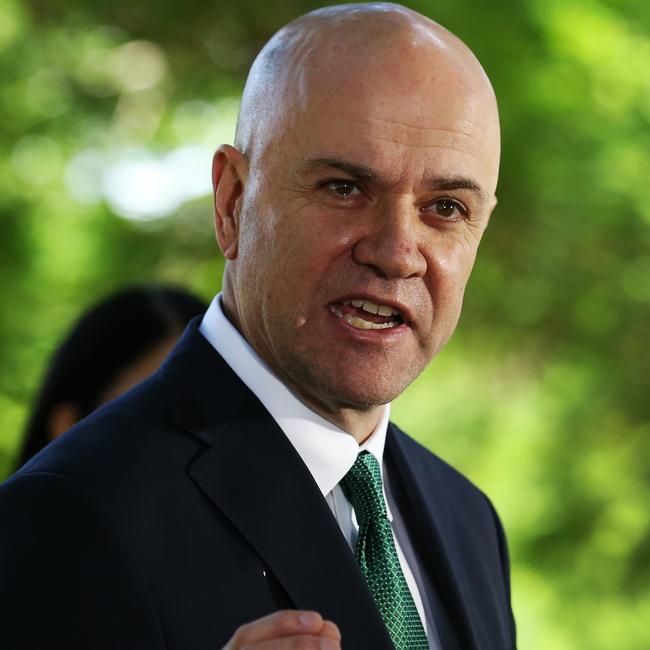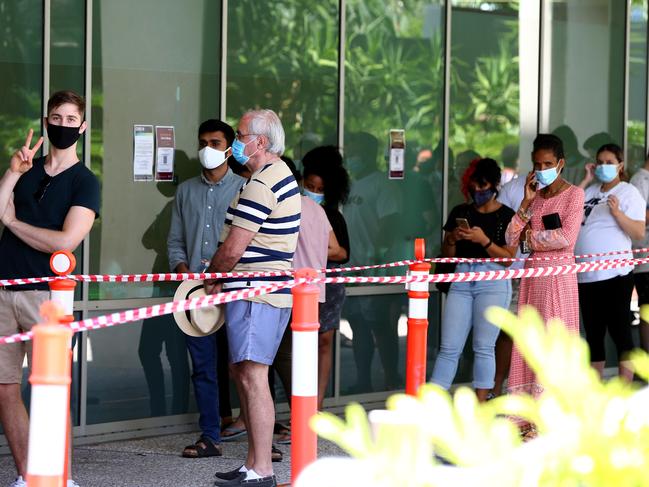Covid Qld: Best time to plunge into viral storm, says CHO
Queensland’s Chief Health Officer says the state must keep moving as it faces a future with tens of thousands of daily Covid-19 cases.
QLD Coronavirus News
Don't miss out on the headlines from QLD Coronavirus News. Followed categories will be added to My News.
Queensland must keep moving forward in its Covid-19 response amid warnings people should brace for tens of thousands of daily cases and seriously ill patients in intensive care.
The warning came as National Cabinet agreed to narrow the definition of a close contact to people living with confirmed Covid-19 cases in a major change that came into effect at midnight.
The significant change comes as Prime Minister Scott Morrison declares Australia must shift its response to the Omicron variant, which he described as a game-changer.
“We need to reset how we think about the pandemic, and how we manage ourselves and the things we need to do as governments,” he said.
The Prime Minister confirmed there would be a nationally consistent definition of a close contact, which would come into effect in NSW, Victoria, Queensland, South Australia and the ACT from midnight.
Tasmania will adopt the new definition from January 1, while the Northern Territory and Western Australia will introduce it at a later date, with announcements to be made in coming days.
A close contact will be narrowed to people who’ve spent at least four hours with a confirmed case in a household or household-like setting, such as an-aged care facility.
They would then be required to isolate for a week and, if they have no symptoms, need to take a rapid antigen test on day six.

Mr Morrison said if the close contact had symptoms they would need to take a PCR test.
Queensland Chief Health Officer John Gerrard, speaking before National Cabinet’s announcement, said the definition of close contacts needed to change as the virus spreads.
“If we continue with our current settings, the country won’t function,” he said.
Queensland authorities have so far been shocked by the low number of hospitalisations as case numbers increase; however, Dr Gerrard tipped that would soon end.
“I’m talking to my colleagues in hospitals on a regular basis and I can say it is likely in the coming days that there will be intensive care admissions … there definitely are sick patients in hospital,” he said.
“We’re not going to be talking about 8000 cases in a few weeks, we’re going to be talking about tens of thousands of cases and that’s what a pandemic is about – very large numbers of cases.”
The top doctor instead suggested Queenslanders incorporate various measures to reduce exposure to the virus, including the use of masks and working from home.
“We need to keep moving on, we need to move on because we are not going to stop the Omicron virus,” Dr Gerrard said.
“There are some things we could do to slow it a little bit, obviously masks are critical (and) I think we’ll increasingly message people in January, when the cases are at a very high rate, if you can work from home that would be a good thing to start thinking about.”

Dr Gerrard noted Queensland was yet to experience major spread in the community since Covid-19 was discovered two years ago but declared yesterday “this is the time to be having a pandemic”.
“If we are to experience this pandemic, in January is probably the best time because it’s warm and we know that the virus spreads more easily in the cooler months,” he said.
Queensland recorded 2222 new Covid-19 cases yesterday, with the state’s active cases surging to 8586.
The new daily record meant there were now 10,752 cases recorded in Queensland since the pandemic started.
There are 86.1 per cent of Queenslanders fully vaccinated and 90.16 per cent having had a first dose.
Dr Gerrard also flagged an overhaul of Queensland’s check-in app amid revelations it was not automatically notifying people who had visited an exposure site.
The CHO insisted the check-in app was notifying people who may have been exposed to a positive case, but said that might change.
“All of this is currently under discussion, but the check-in app is still important at the moment,” he said.
Dr Gerrard said there was no concern with people taking to social media to contact trace as Queensland Health reduces its tracking of the virus.
“If people want to avoid getting infected, that’s fine,” he said.




